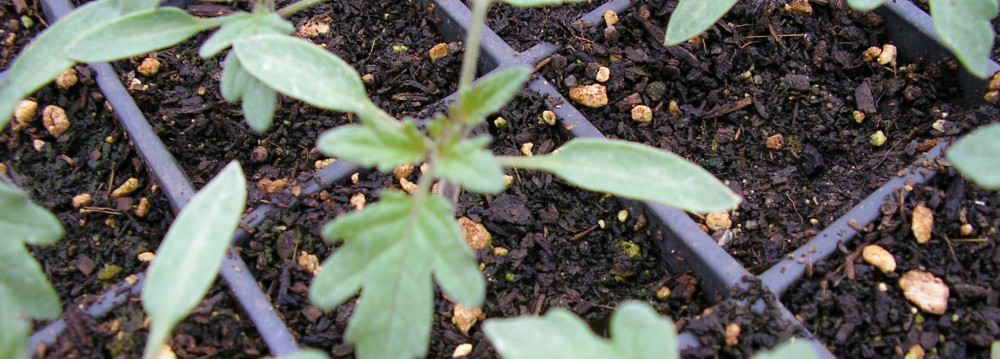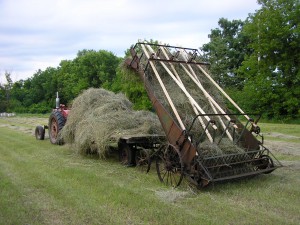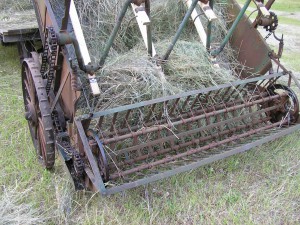Riverbend Farm Newsletter July 19, 2014
Well, I’m back. If you didn’t notice, I was away for the past couple weeks. If you didn’t notice, you will know that our crew did a great job while I was away. Things looked great around here when I got back.
I have a collection of motorcycles and they do me no good in the winter. I like a summer vacation. This was a year for a bike trip. My default trip is out west and usually I take my ’70 Norton Commando. This winter I had straightened the frame on the Commando and ran out of time to put it back together.
My ’82 Honda Silverwing (GL500, not to be confused with the new scooter with the same name) got the call. This is the only bike that I have ever bought new. The Goldwing is Honda’s top of the line touring bike. Now they are 1800cc, 900 pound two wheeled Honda Accords (it has a bigger motor than my Civic). They are great bikes. For $24,000 they should be, but not my cup of tea.
Back in the day, I figured that the Golding was Honda’s take on a BMW and the Silverwing was their idea of what a Moto Guzzi should be, but still a bit of a rolling physics experiment. The GL500 has a 500cc engine in what used to be a full sized motorcycle frame. The bike weighs about 500 pounds and is pretty manageable even if it does not have a reverse gear.
This year has had its share of farming challenges. Last year did too. Lately it seems like I have been trying to manage chaos, working from crisis to crisis. Exciting, but really not that much fun, and very hard to plan for. It was a good time to get away and see a bit of how the other half lives.
My friend Steve had proposed a trip down into Arizona, New Mexico, Utah, etc. back in January. I said ‘it is hard to know how the season will play out, but pencil me in.’ A couple weeks before we left, he says he is bailing on the trip. My response was ‘if you aren’t going, I’m going to Washington and Oregon and visit some farms that are growing veggies and veggie seeds.’ He says ‘I’m in, but I want to see this land I inherited ( 1/18th share with some possibility of an oil lease) in Utah.’
As we worked our way towards Brookings, there were a lot of fields that were not planted this spring. As it turned out, over half a million acres in Minnesota were too wet plant. They were either weeds or cultivated fallow. As we got farther west more fields were planted, but they still had big areas that had been drowned out. Into South Dakota the corn looked better, but the soybeans were still pretty tough looking.
As we crossed the Missouri the landscape turned to desert. There is a lot of desert out there. And it was hot. Steve’s bike ( ’89 Honda Transalp) started to misfire and eventually would quit running all together. We checked the power and grounds ( somewhat loose) and eventually replaced one of the CDI ignition units. It did not help. I think he has a bad coil pack.
After a beautiful run down from Green River Wyo. Into Vernal Utah his bike ran okay. Once it got hot going into Duchene, it started to misfire again. He was going to look at the land the next morning and I was looking at the map. Fiddling with his bike had eaten up a couple hours each day and at this point had cost us most of a day. Sequim Washington is about 1100 miles from Duchene Utah and I was planning on being there in a couple days.
Steve was thinking about visiting his son and son in law near Leavenworth Washington on the way back. And he would not be back from visiting the land until at least 1 on the afternoon. It was looking like either a pair of 500 and 600 mile days or 400 and 700 mile days. Neither were very likely nor sounded like much fun starting in the afternoon. I proposed meeting him in Leavenworth on Sunday. By morning, he decided his trip was over and was going to head home.
It was a long interstate run to Olympia WA. 101 North was a beautiful trip. It should have been the height of tourist season, but the roads were deserted. It put a smile on my face and a little more tension on the throttle cable. My destination was Nash’s Produce in Sequim Washington. Nash grows a lot of vegetables, small grain and organic vegetable seed.
The northern shore of the Olympic peninsula is the perfect place for growing brassicas, carrot, beet, kale, lettuce seed. It rains in the spring and then stops. The winter temperatures are typically close to freezing. Until recently any way. Now it has started raining in September, just when they are trying to harvest their vegetable seed and small grain. Not to mention that last winter was exceptionally cold and damaged many of the over wintered crops. It was a very interesting visit. I spent almost an entire day there.
John Navazio is an organic seed breeder with the Organic Seed Alliance. He spent a couple hours showing me his test plots of spinach, onions and carrots. He is most interested in a purple sprouting broccoli. It is hardy enough to survive their winters and produce in April. I don’t think it would work the same way here, but it was fascinating hearing about how he selects for disease resistance, plant stature, winter hardiness, taste, and storage. All at the same time. It takes years of selection to produce a new variety.
On my way south I stopped at Midori Farm. They have been farming for several years and had just bought a new place on some of the best soils on the peninsula. I helped out harvesting and cleaning crates while Marko and I talked shop. They were in the middle of a heat wave and crops were coming in much earlier than usual. There were no tomatoes grown outside, they were all in hoophouses.
The last farm visit I had planned fell through. The guy was going to the Oregon Country Fair. I had been hearing about it since Idaho. I had to see it for myself. It cost $42 to get in and park. This was clearly a big deal. Except there was nothing country about it, lots of crafts, tie dyed clothes, and ceramics with several music stages. The site was huge. It clearly was not the west coast version of the Common Ground Fair. It struck me as the Renaissance Festival for Hippies, but without the turkey legs. I’m obviously missing something because 40,000 people go through the gates in three days, but I don’t get the Renaissance Festival either.
There are some great roads between Oregon and here, but I’m not going to tell you about them.
While I was away I did not keep up on the daily news. As it turns out, I did not miss much. There is an article that turned up a while ago about avoiding the news. I think they have it mostly right. http://dobelli.com/wp-content/uploads/2010/08/Avoid_News_Part1_TEXT.pdf
Once I was back the crew graciously let me take a few more days off to catch up on things that I should have been doing instead of wondering around the country visiting farms.
In the days or horse drawn agriculture there was piece of equipment that picked up loose hay and piled it on a wagon. Loose hay works great for mulch. I can just throw it off the wagon and skip the step of breaking up hay bales. A few years ago I found a hay loader that was in fair shape but needed the wooden parts replaced. It took a coupe days to get it back into working order.
Now when it is too wet for my neighbor Norman to make hay I can cut and pick it up for mulch. Even if the hay isn’t dry it can be picked up and spread as mulch. This year the weeds in the tomatoes got ahead of us because we had the tomato stakes in before it was dry enough for Norman to make any hay (for mulch).
Here is a picture of the business end of the hay loader. The teeth on the very back rake the hay ahead until there is enough that it caught on the tines that are attached to the light colored wooden bars. The big crankshaft with the bars turn ‘backwards’ and the tines push the hay up the inclined bed. It is a very cool machine.
Greg


